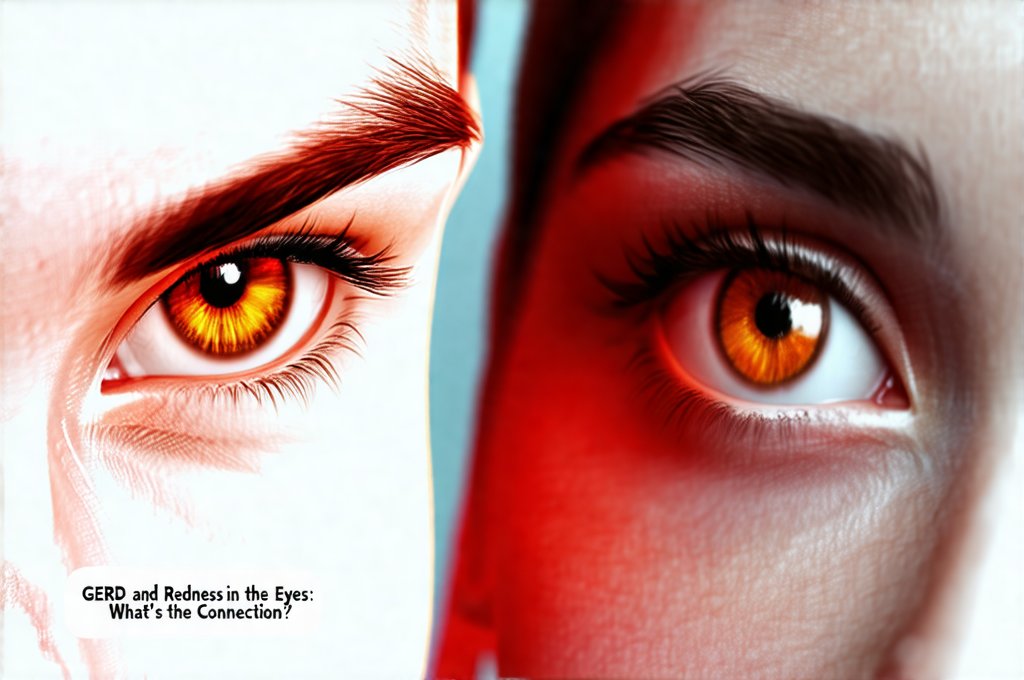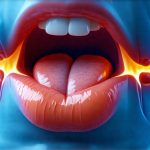Gastroesophageal reflux disease (GERD), often simply called acid reflux, is a surprisingly common condition affecting millions worldwide. Many associate it primarily with heartburn, that burning sensation in the chest after eating. However, GERD’s reach extends far beyond digestive discomfort. It can manifest in ways people rarely suspect—and one of these surprising manifestations is redness or irritation in the eyes. This seemingly unrelated symptom points to a complex interplay between our digestive system and other parts of the body, highlighting how interconnected our health truly is. Understanding this connection isn’t about self-diagnosing; it’s about recognizing potential patterns and informing your healthcare provider for accurate assessment and care.
The reason why acid reflux can lead to eye redness isn’t a direct splash of stomach acid into the eyes (though that can happen in extreme cases). It’s more subtle, often involving inflammatory responses triggered by the body attempting to cope with chronic irritation. The digestive system is intrinsically linked to our immune function, and ongoing inflammation within the esophagus and stomach can have systemic effects, impacting areas like the delicate tissues surrounding the eyes. Furthermore, certain lifestyle factors that contribute to GERD—like stress and sleep deprivation—also play a role in eye health, creating a confluence of issues that make pinpointing the exact cause challenging. Recognizing this connection is the first step toward seeking appropriate evaluation and relief. You might also find useful information regarding the role of chewing gum in managing GERD symptoms.
The Inflammatory Pathway: How GERD Impacts Eye Health
The link between GERD and eye redness isn’t always straightforward but frequently involves an inflammatory cascade. When stomach acid repeatedly backs up into the esophagus, it causes irritation and inflammation there. This chronic inflammation doesn’t remain localized; instead, the body’s immune system responds to this perceived threat, releasing inflammatory markers throughout the bloodstream. These markers can then affect various tissues, including those around the eyes, leading to redness, itching, burning sensations, and even a feeling of grittiness or foreign body sensation. It’s important to understand that this isn’t necessarily an allergic reaction but rather an immune response to ongoing internal irritation. Understanding the liver’s role in overall health can also provide context for inflammatory responses.
The inflammation associated with GERD can also exacerbate existing eye conditions. For example, people prone to dry eye syndrome may find their symptoms worsen during periods of frequent reflux. Acid reflux can disrupt the tear film – the protective layer that keeps eyes lubricated – leading to increased dryness and sensitivity. Similarly, individuals with blepharitis (inflammation of the eyelids) might experience more flare-ups when GERD is poorly managed. The chronic stress on the body from dealing with persistent acid reflux further contributes to overall inflammation, making it harder for the immune system to regulate these conditions effectively. Moreover, some research suggests a possible link between GERD and certain autoimmune diseases that can affect the eyes. While more studies are needed, there’s growing evidence that chronic inflammation caused by GERD may contribute to the development or exacerbation of autoimmune responses targeting ocular tissues. This highlights the importance of addressing GERD proactively not just for digestive health but also for potential long-term systemic impacts. It is important to note that GERD and asthma are often interconnected conditions, further impacting overall inflammation levels.
Recognizing Ocular Symptoms Related to GERD
Pinpointing whether eye redness is related to GERD requires careful observation and consideration. It’s crucial to note that many things can cause red eyes, including allergies, infections, environmental irritants, and lack of sleep. However, certain patterns may suggest a connection with acid reflux. – The redness tends to be more persistent than what you’d expect from a typical allergy flare-up. – Symptoms often worsen after meals, particularly large or fatty ones. – There might be accompanying digestive symptoms like heartburn, regurgitation, bloating, or difficulty swallowing. – Other potential ocular symptoms include itchy eyes, burning sensation, gritty feeling, and blurred vision.
It’s also important to differentiate between a sudden onset of redness accompanied by pain, discharge, or changes in vision—which requires immediate medical attention—and a more gradual, chronic redness that seems to fluctuate with digestive symptoms. If you experience the former, seek urgent care. But if your eye redness is persistent and linked to meal times, it’s worth discussing with your doctor. Remember that self-diagnosis can be misleading; professional evaluation is essential for accurate identification of the underlying cause. Understanding the role of antacids in managing GERD symptoms can also assist in treatment decisions.
Consider keeping a symptom diary, noting when eye redness occurs in relation to meals, digestive symptoms, sleep patterns, and stress levels. This information can be invaluable when you consult with your healthcare provider. Documenting these details provides valuable context and helps narrow down potential causes. Furthermore, it demonstrates your proactive engagement in understanding your health, which aids the diagnostic process.
Lifestyle Modifications for Both GERD & Eye Health
Addressing GERD often involves a combination of lifestyle changes and, potentially, medication. Many of the same adjustments that help manage acid reflux can also benefit eye health. – Dietary Changes: Avoid trigger foods like caffeine, alcohol, chocolate, spicy foods, fatty foods, and citrus fruits. Eat smaller, more frequent meals instead of large ones. – Elevate Your Head: Raise the head of your bed by 6-8 inches to help prevent acid reflux during sleep. This can be achieved with bed risers or a wedge pillow. – Weight Management: If you are overweight or obese, losing weight can significantly reduce GERD symptoms. Obesity increases abdominal pressure, contributing to reflux.
Beyond these specific measures, prioritizing overall well-being is crucial. Adequate sleep (7-8 hours per night) reduces stress and supports immune function. Regular exercise promotes healthy digestion and reduces inflammation. Managing stress through techniques like yoga, meditation, or deep breathing exercises can also play a significant role in both GERD management and eye health. Staying hydrated by drinking plenty of water throughout the day helps maintain tear film production and overall bodily functions. Food and mood are also closely linked, so mindful eating is important!
When to Seek Medical Attention
While lifestyle modifications can often provide relief for mild GERD symptoms, it’s essential to know when to seek medical attention. – If you experience severe or persistent heartburn that doesn’t respond to over-the-counter medications. – If you have difficulty swallowing (dysphagia) or feel like food is getting stuck in your throat. – If you experience chest pain, especially if accompanied by shortness of breath or jaw/arm pain. – If your eye redness is sudden onset, painful, accompanied by vision changes, or discharge.
For eye-related concerns specifically, consult an ophthalmologist (eye doctor) to rule out other causes of redness and irritation. They can perform a comprehensive eye exam to assess tear film production, eyelid health, and overall ocular function. Your primary care physician or gastroenterologist can evaluate your GERD symptoms and recommend appropriate treatment options, which may include proton pump inhibitors (PPIs), H2 blockers, or lifestyle adjustments. Remember that early diagnosis and management are key to preventing complications from both GERD and related eye conditions. Considering the connection between GERD and hiccups can also help understand the breadth of this condition’s impact. Finally, understanding the role of bile is key to digestive health overall.


















